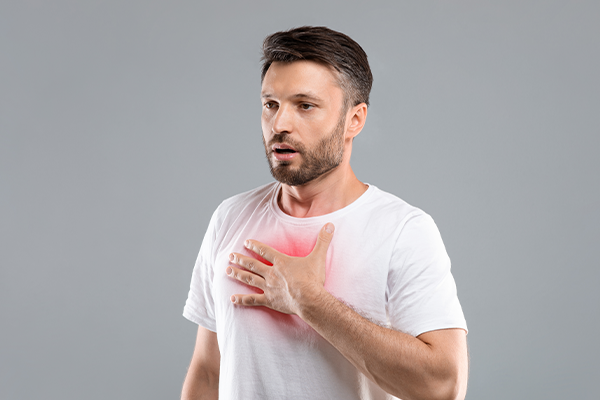
Experiencing a sudden tightness or pressure in your chest can be alarming, often raising concerns about heart-related issues. However, not all chest discomfort stems from cardiac problems. One common, yet often overlooked, cause is trapped gas. Understanding the symptoms, causes, and remedies can help alleviate discomfort and provide peace of mind. This blog discusses in detail how the gas can get trapped in the chest, what the symptoms are and effective remedies to treat it immediately.
Synopsis
Understanding Trapped Gas in the Chest
Trapped gas occurs when gas accumulates in the digestive tract and isn't expelled efficiently. This buildup can lead to sensations of pressure, bloating, and even sharp pains in the chest area. While it might mimic more serious conditions, gas-related chest pain is typically harmless and manageable with appropriate measures.

Common Symptoms of Trapped Gas
Identifying the signs of trapped gas can help differentiate it from other conditions:
-
Sharp or jabbing pain in the chest or abdomen
-
Bloating or a feeling of fullness
-
Belching or flatulence
-
Abdominal cramping
-
Sensation of pressure moving through the abdomen
It's essential to note that while these symptoms are often benign, persistent or severe discomfort should prompt medical evaluation.
Causes of Trapped Gas
Several factors can contribute to gas accumulation:
-
Swallowing air: Eating or drinking too quickly, chewing gum, or consuming carbonated beverages can introduce excess air into the digestive system.
-
Dietary choices: Foods high in fibre, certain carbohydrates, and artificial sweeteners can increase gas production.
-
Digestive disorders: Conditions like irritable bowel syndrome (IBS) or lactose intolerance can lead to excessive gas.
-
Constipation: Slower movement of stool can cause gas to build up behind the blockage.
Understanding these causes can aid in both prevention and treatment.
Effective Remedies for Trapped Gas
If you're experiencing discomfort from trapped gas, several strategies can provide relief:
-
Gentle movement: Activities like walking or stretching can help move gas through the digestive tract.
-
Warm compress: Applying a heating pad to the abdomen can relax muscles and ease pain.
-
Herbal teas: Drinking teas made from peppermint, ginger, or chamomile may soothe the digestive system.
-
Over-the-counter remedies: Products containing simethicone can help break up gas bubbles.
-
Dietary adjustments: Reducing intake of gas-producing foods and eating smaller, more frequent meals can prevent future episodes.
Implementing these remedies can alleviate symptoms and improve overall digestive comfort.
When to Seek Medical Attention
While trapped gas is generally harmless, certain symptoms warrant professional evaluation:
-
Persistent or severe chest pain
-
Dizziness or fainting
-
Pain radiating to the arm, neck, or jaw
These signs could indicate a more serious condition, such as a heart attack, and require immediate medical attention.
Preventing Future Episodes
To minimise the occurrence of trapped gas:
-
Eat slowly: Taking time to chew thoroughly can reduce swallowed air.
-
Limit carbonated drinks: These beverages can introduce excess gas into the digestive system.
-
Monitor food intolerances: Identifying and avoiding trigger foods can prevent symptoms.
-
Stay active: Regular physical activity promotes healthy digestion.
By adopting these habits, you can reduce the likelihood of experiencing trapped gas and its associated discomfort.
Conclusion
Chest pressure can be unsettling, but understanding the causes of trapped gas can demystify the experience. By recognising symptoms, implementing effective remedies, and knowing when to seek medical care, you can manage discomfort and maintain digestive health. Always consult with an expert cardiologist in Patiala if you're uncertain about your symptoms or if they persist.
FAQ's
Yes, trapped gas can lead to sensations of pressure or sharp pain in the chest area. This occurs when gas accumulates in the digestive tract, causing distension and discomfort that can radiate to the chest.
Gas-related chest pain often presents as sharp or stabbing sensations that may improve with belching or passing gas. It is frequently associated with bloating and discomfort after eating. In contrast, heart-related chest pain, such as that from a heart attack, typically feels like pressure or squeezing and may radiate to the arm, neck, or jaw, often accompanied by shortness of breath, sweating, or nausea. If you're uncertain about the cause of your chest pain, seek immediate medical attention.
Trapped gas can result from various factors, including:
-
Swallowing air: Eating or drinking too quickly, chewing gum, or smoking can introduce excess air into the digestive tract.
-
Dietary choices: Consuming gas-producing foods like beans, lentils, carbonated beverages, and certain vegetables.
-
Digestive disorders: Conditions such as irritable bowel syndrome (IBS) or gastroesophageal reflux disease (GERD) can increase gas production.
-
Constipation: Slower movement of stool can cause gas to build up behind the blockage.
Several strategies can help relieve gas-related chest discomfort:
-
Gentle exercise: Activities like walking or yoga can promote gas movement through the digestive tract.
-
Warm compress: Applying heat to the abdomen can relax muscles and ease pain.
-
Herbal teas: Peppermint, ginger, or chamomile teas may soothe the digestive system.
-
Over-the-counter medications: Products containing simethicone can help break down gas bubbles.
-
Dietary adjustments: Avoiding gas-producing foods and eating smaller, more frequent meals can prevent future episodes.
While gas-related chest discomfort is usually harmless, consult a cardiologist in Patiala if you experience:
-
Persistent or severe chest pain: Especially if it doesn't improve with typical remedies.
-
Associated symptoms: Such as shortness of breath, dizziness, sweating, or pain radiating to the arm, neck, or jaw.
-
New or unusual symptoms: To rule out serious conditions like heart disease.





















 5 Min Read
5 Min Read




.png)












